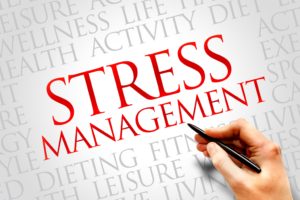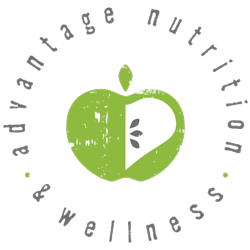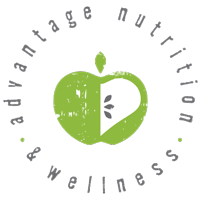Stress and Emotional Eating
By: Angie Moreno

April 16th is National Stress Awareness Day. Throughout the month of April, you may hear talk about the causes and cures for stress, the many circumstances which can trigger stress—things like job, money, relationships, illness, school, loss of a loved one, and so on—and, how the effects of stress, when not kept in check, can really take a toll on one’s health and well-being.
Literature about the negative effects of stress typically focus on physical health, such as increased blood pressure, increased risk of heart attack, stroke, and a myriad of illnesses. However, stress also affects mental and emotional health. Effects include confusion, unexpected mood changes, anger, anxiety and depression.
How we deal with stress ultimately influences the extent to which stress affects our bodies and our minds. Question to the reader—do you ever stop and think about how you deal with stress? When you feel overwhelmed or anxious, what do you do to make yourself feel better? Some people engage in positive outlets for stress relief such as exercise to raise those feel-good endorphins while others feel better after a good vent session. Nevertheless, while there are many approaches to relieving stress, some methods are not beneficial and can negatively impact one’s health. One method I want to address is turning to food for comfort, or emotional eating.

Turning to food for comfort may be a conscious or unconscious reaction when faced with a difficult problem or feelings of stress. And, how emotional eating becomes the stress relief method of choice could be different from person to person. Triggers can range from major life events to daily life stressors which cause negative emotions. But one thing is constant—the reason for engaging in emotional eating is to suppress or calm negative emotions.
Emotional eating is impulsive; often times it is binge eating whatever is convenient and without enjoying the food consumed. Typically, there is no actual hunger involved. And, the more often the response to eat accompanies negative feelings, the more emotions become tied to eating habits. This continued response can progress to automatically turning to food any time a person is faced with negative feelings of anger or stress.
Subsequently, engaging in stress-induced emotional eating brings on a host of issues all its own. The act of emotional eating itself can trigger further adverse feelings like guilt and disappointment leading to an unhealthy food-mood cycle. Stress or negative emotions trigger a bout of overeating, then you feel badly for overeating which triggers you to overeat again. And the cycle keeps going.

So, if this is a behavior you can relate to, you are probably asking, “How do I break the food-mood cycle?” The good news is behaviors can change. You can regain control and change how you deal with stress. Two key steps are 1.) Identifying your stressors 2.) Recognizing the difference between emotional eating and eating for hunger or enjoyment. Acknowledging these factors will benefit you greatly with any behavior change techniques you try to implement.
Once you’ve identified the above, there are several methods you can try to curb or even help stop emotional eating:
- Keep a food journal. Write down everything you eat. What, how much, and what times. Most importantly, identify how you’re feeling when you eat and rate your level of hunger (try using a 1 to 5 or 1 to 10 scale). You may be able to detect patterns between your mood and the food you eat.

- Address your stress. A big part of this journey will be managing the things that cause you stress. If stress triggers emotional eating, you may want to try implementing stress control techniques like progressive muscle relaxation, deep breathing, visualization and imagery, and so on.
- Check in with your hunger. If you’re having a moment and feel a craving coming on, take a minute to evaluate your feeling. Are you feeling stressed? Did you eat recently? Are you actually hungry or do you just feel like eating? Give yourself a moment to check in and acknowledge where the desire to eat is coming from.
- Remove temptation. Don’t keep comfort foods in your home. If there are specific foods that you turn to when you eat out of emotion, do not keep them
 in your home.
in your home. - Choose healthy snacks. And, if you feel the urge to eat between meals? Again, check-in and decide if those hunger pangs are legitimate. If you conclude they are, opt for something healthy, like fruit, yogurt, or a handful of nuts.
- Setbacks happen. We’re human. Mistakes and setbacks happen. The key thing is not to dwell on your mistake and continue to beat yourself up about it. If you have a moment of emotional eating, leave it in the past. Tomorrow is a new day. What you can do is learn from that incident and think of ways to ensure it doesn’t happen again. And, give yourself credit for the constructive changes you are making to improve your health—mentally and physically.
Subsequently, if self-help techniques are not working, you may benefit from seeking help about emotional eating. Counseling is a valuable process that can help you gain understanding about your behaviors and learn methods that will allow you to cope. If you have questions regarding emotional eating or other dietary matters, contact the dietitians at Advantage Nutrition & Wellness and ask them about their Nutrition Counseling services. For more information and tips to control emotional eating, visit the Mayo Clinic website.
Angie Moreno is a contributing writer with a BA in Psychology and BS in Nutrition. She has worked in corporate wellness for over 18 years, is also a certified Health Coach and Personal Trainer, and has written for several fitness magazines. She is a proponent of promoting good health through nutrition, fitness, and overall wellness.


